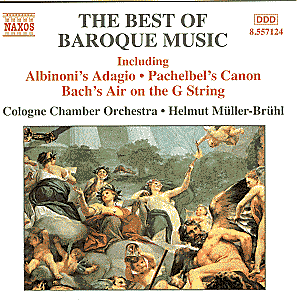Naxos
has been releasing many compilation discs, and "The Best
of Baroque" is the latest to hit the record stores. These
types of recordings are not intended for serious collectors, but
for new listeners who want to get a sampling of a particular composer
or genre.
The
first measure of this new discís merit is the degree to which
it does offer the best of baroque music. One quickly notes that
all the programmed works on the disc are of the orchestral variety
and that only one performing group is presented. Using just the
Cologne Chamber Orchestra is quite a limitation on the variety
of music that can be offered. It also brings up another limitation
in that we get three Telemann pieces of dubious Ďgreatnessí, while
Vivaldiís ever-popular "The Four Seasons" is entirely
absent. In essence, this is the way it has to be since Müller-Brühl
has not recorded "The Four Seasons". Considering the
extent of the Naxos back-catalog of baroque music, the Ďone groupí
approach does not appear wise.
Concerning
the performances themselves, the Cologne Chamber Orchestra is
a fine modern instrument band and has recorded often for Naxos.
The groupís recordings of Bach have been well received, and they
have also ventured into the Classical era with discs of Haydnís
Symphonies and the Cello Concertos.
Generally,
the interpretations on the new disc are stylish and rewarding.
In fact, Tracks 1-6 are exceptional. Handelís "Arrival of
the Queen of Sheba is an exciting listening experience as are
Bachís Badinerie and the Allegro from the Brandenburg Concerto
No. 2. Poignancy is fully conveyed in Bachís Air and the Corelli
Pastorale. Most impressive is the definition and interplay between
the two solo violins in Bachís Concerto in D minor.
Problems
begin to crop up with the Largo from Handelís opera "Serse",
which is music that should pierce the listenerís heart. However,
the orchestra is merely efficient, never digging deeply into the
incisive human longing conveyed within the context of the opera.
The
woodwinds present my primary skepticism. The solo oboe and especially
the solo recorder sound thin and shrill, making it difficult to
enjoy the otherwise excellent performances of the Albioni Adagio
from the Oboe Concerto, and the two Telemann pieces from his Recorder
Suite. Particularly troublesome is the Largo from Vivaldiís Falutino
Concerto where the recorderís piercing sounds could be damaging
to oneís eardrums.
There
are many Bach compilation discs in well-stocked record stores
to choose from that are consistently engaging and well engineered.
Given the less than fully satisfying program and the shrill woodwinds,
the Naxos "Best of Baroque" disc represents a low priority
and I can only offer a tepid recommendation to new Bach listeners.
The more seasoned Bach record collector has no reason to consider
the disc.
Naxos
has provided the classical music world such a great service with
its various complete series of composersí bodies of works, instrumental
series like the Organ Encyclopedia, the American Classics series,
and the discovery of obscure works that might have never seen
the light of day. However, this "Best of" recording
strategy is beginning to get old. Snippets and movements from
major works are not my idea of a worthy presentation of any composerís
music, and Naxos shouldnít think that new classical music fans
have only a short attention span. Still, I am always at the ready
to praise this type of enterprise if the performances and programs
live up to the artistry of the composer. In this case, Naxos,
Helmut Müller-Brühl and the engineering crew are not
consistently suitable.
Don
Satz


